EmorMaking Waves at the Olympics
Emory alum Andrew Wilson becomes first
Division III swimmer to compete for Team USA (COPY)
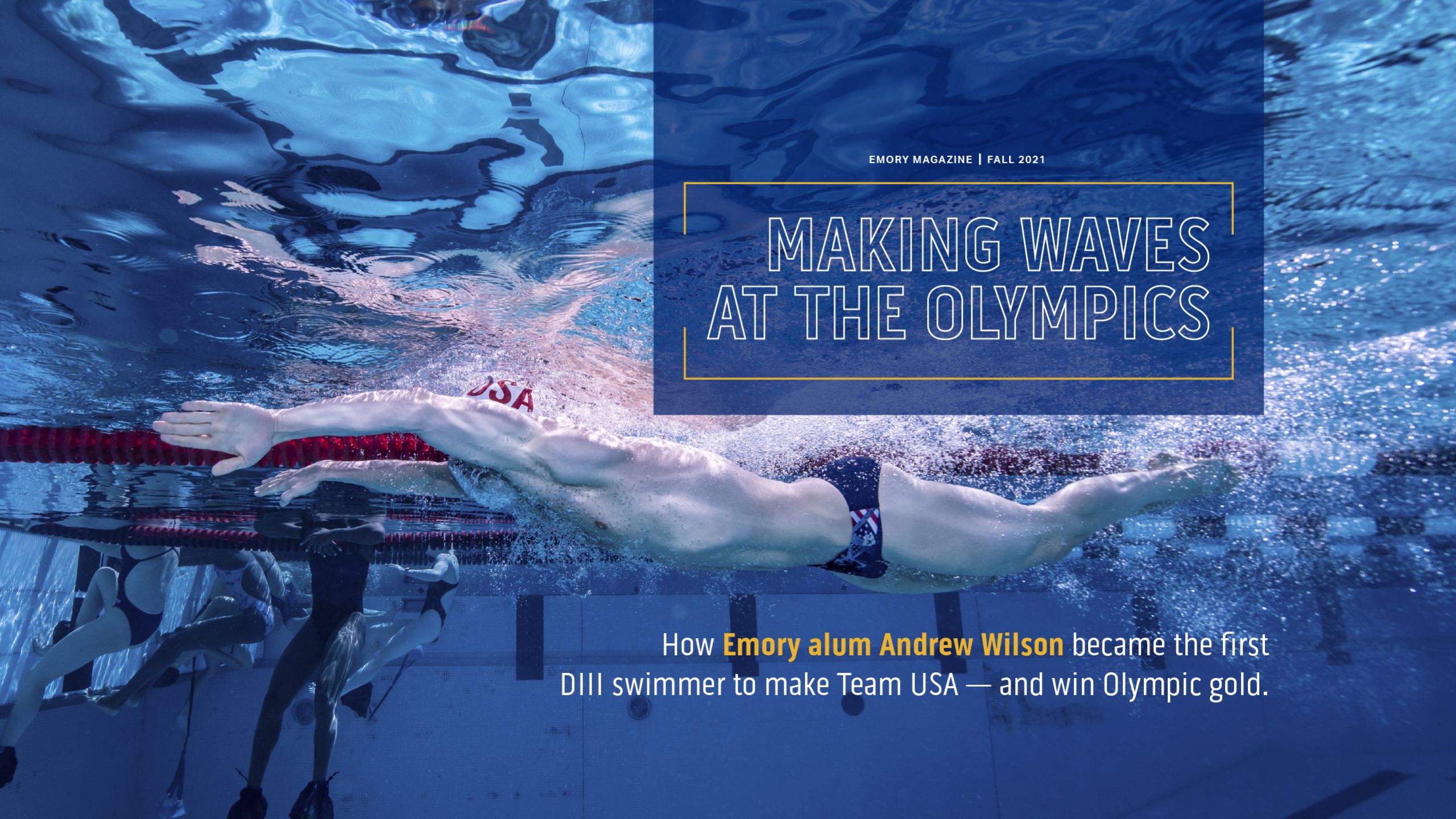
When it comes to swimming, Andrew Wilson 17C would be the first to admit he was a late bloomer. “Growing up, I was more focused on lacrosse,” Wilson says. “I didn’t think of myself as a swimmer first — it was just kind of what I did in the summer.”
In fact, unlike most of the nation’s top swimmers with Olympic pedigrees, the former Emory superstar didn’t train and compete year-round in the pool until he got to college. It’s no surprise Wilson wasn’t recruited by NCAA Division I swimming programs, and it took a lot of convincing to earn a spot on Emory’s perennial Division III powerhouse team.
But Jon Howell, the Eagles’ longstanding head swimming coach, saw something special in Wilson.
"It's a crazy privilege to put on the cap with our flag on it": Hear Andrew Wilson describe his journey to the Tokyo Olympics.
“When I first met Andrew, he was just a junior in high school,” Howell says. “He was a strong swimmer, but not at our competitive range at that point — which is not uncommon. I gave him some times to shoot for, and he wasn’t intimidated by them. Some kids get insulted or deflated by that type of feedback, but it was a motivator for Andrew. He was smart, too, and definitely the kind of fit both academically and athletically we look for at Emory.”
The two stayed in touch over the next year, with Howell tracking his progress.
“He did get better, but he was still a step or two away from our time standards,” Howell says. “When he told me he wanted to come to Emory, I talked to his coaches and a few of my contacts in the swimming world, and they all had really great things to say about him. All of this chatter lined up with my gut instinct about Andrew, and I decided to offer him a spot — which obviously was the right choice.”
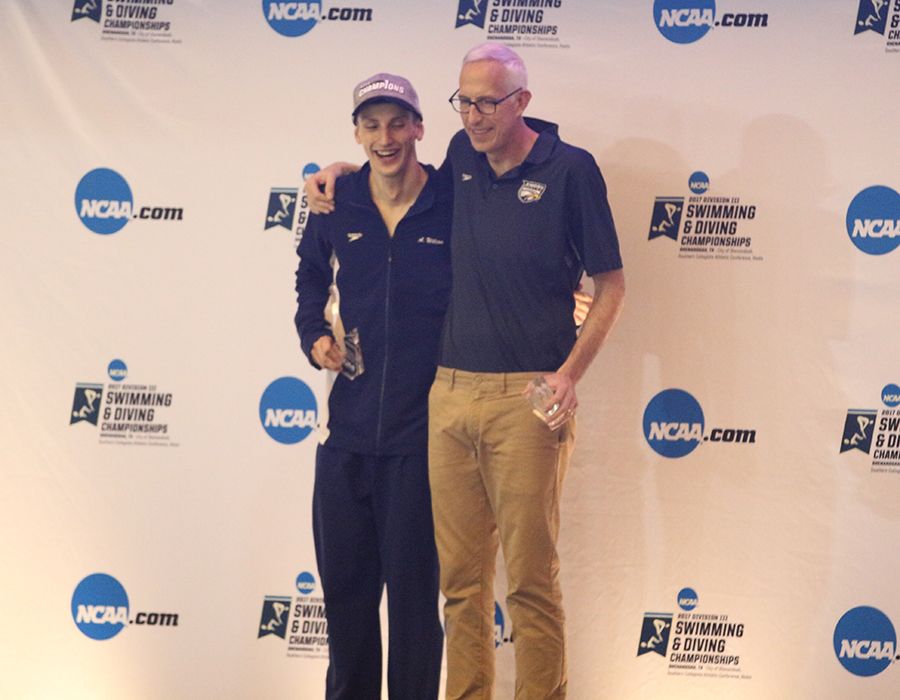
Emory's Andrew Wilson and Jon Howell at the 2017 NCAA Division III National Swimming and Diving Championships
Emory's Andrew Wilson and Jon Howell at the 2017 NCAA Division III National Swimming and Diving Championships
Wilson thrived both athletically and academically at Emory, becoming the university’s most decorated swimmer ever, leading the men’s team to its first-ever national championship in 2017 and earning CSCAA National Swimmer of the Year honors twice. And this past July, the 27-year-old Wilson accomplished something that no other D-III swimmer ever has: represent Team USA in the Olympic Games.
Not only did he compete in the individual 100- and 200-meter breaststroke events in Tokyo — making the finals in the 100-meter — he won a gold medal as part of the men's 4x100 medley relay team, swimming breaststroke in the qualifying heat on the way to the Team USA’s win.
Though he faced tall odds competing against the world’s best at the 2021 Tokyo Olympics, Wilson has been defying expectations his entire life.
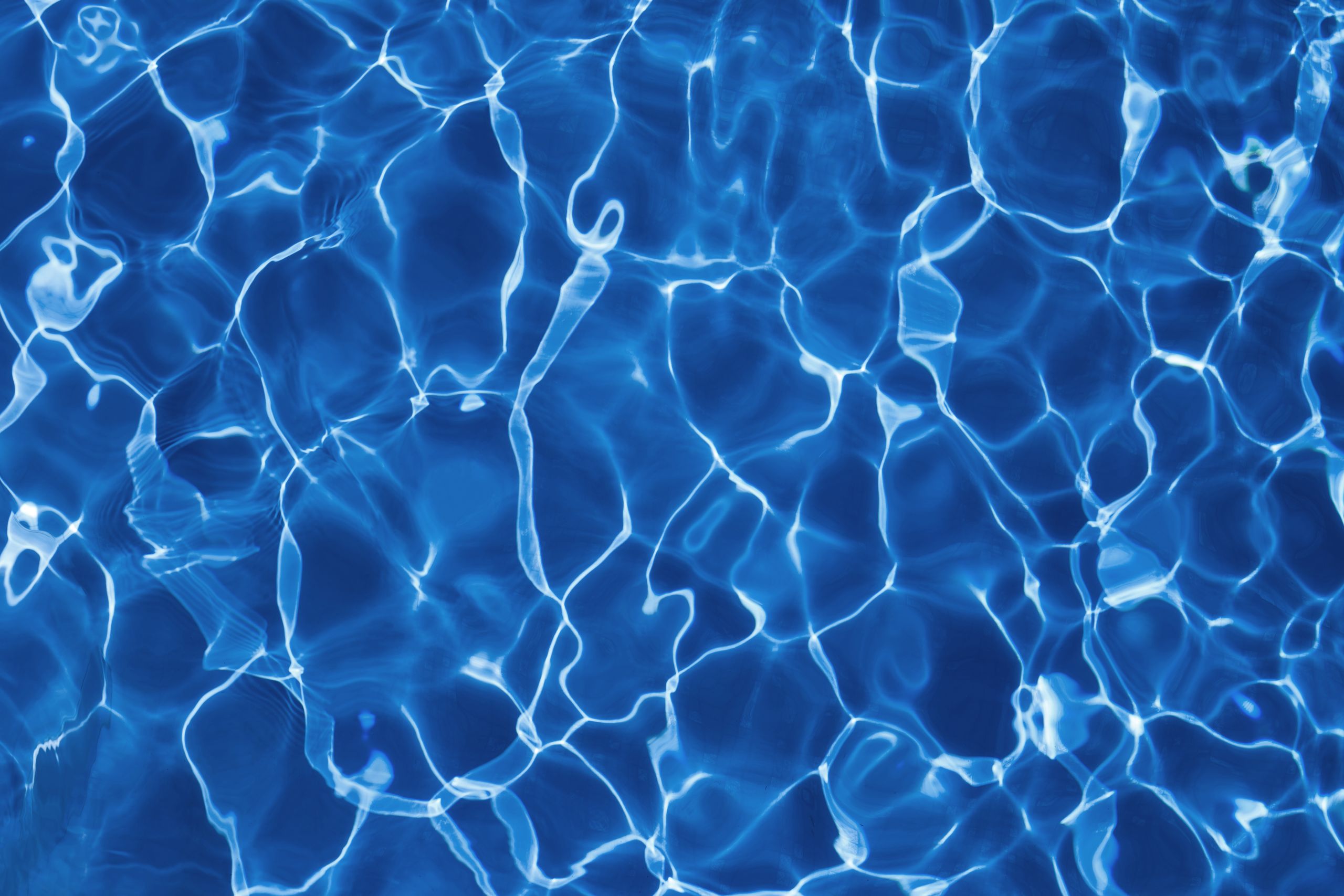
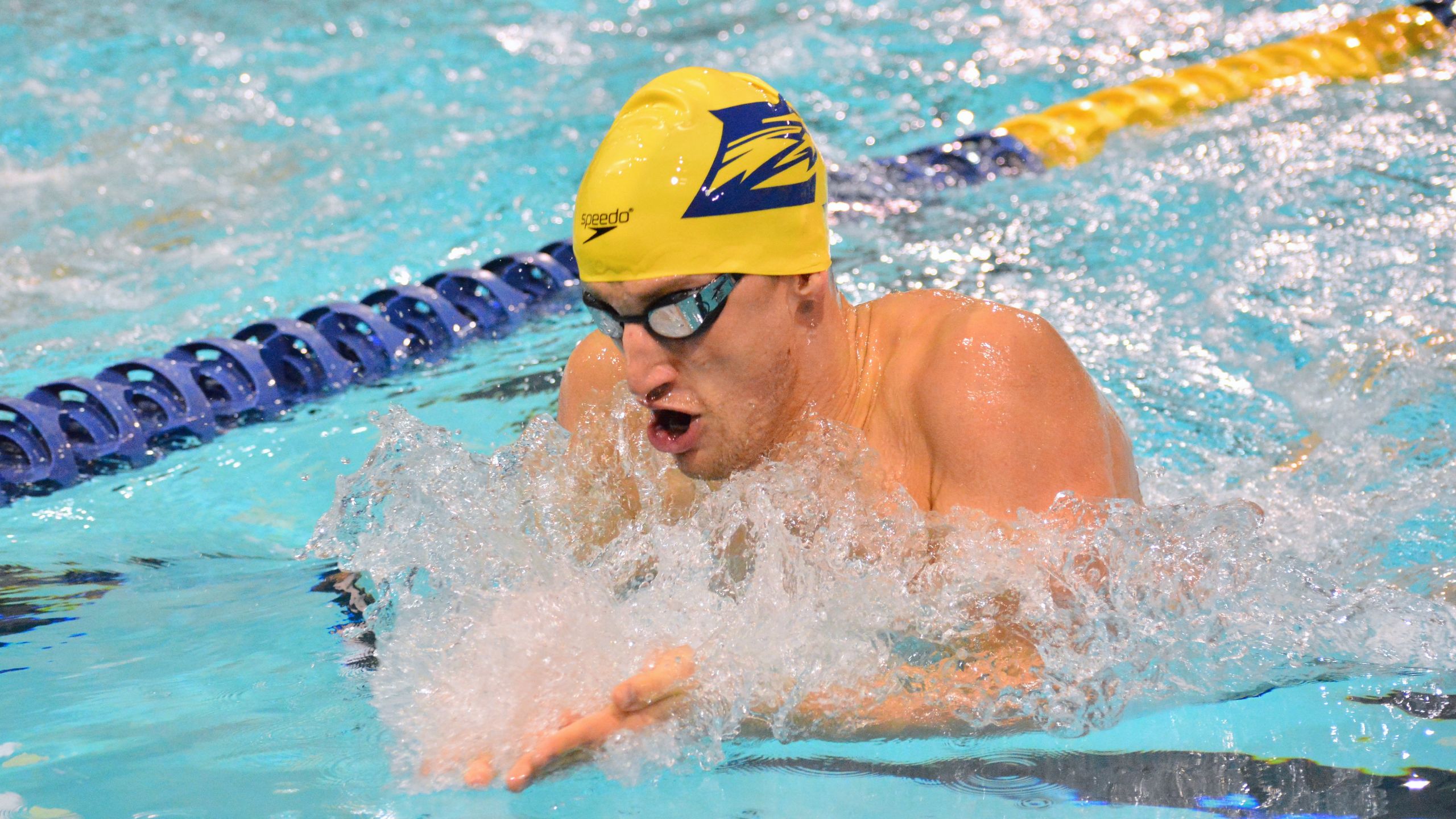
Flourising in the Pool and Classroom
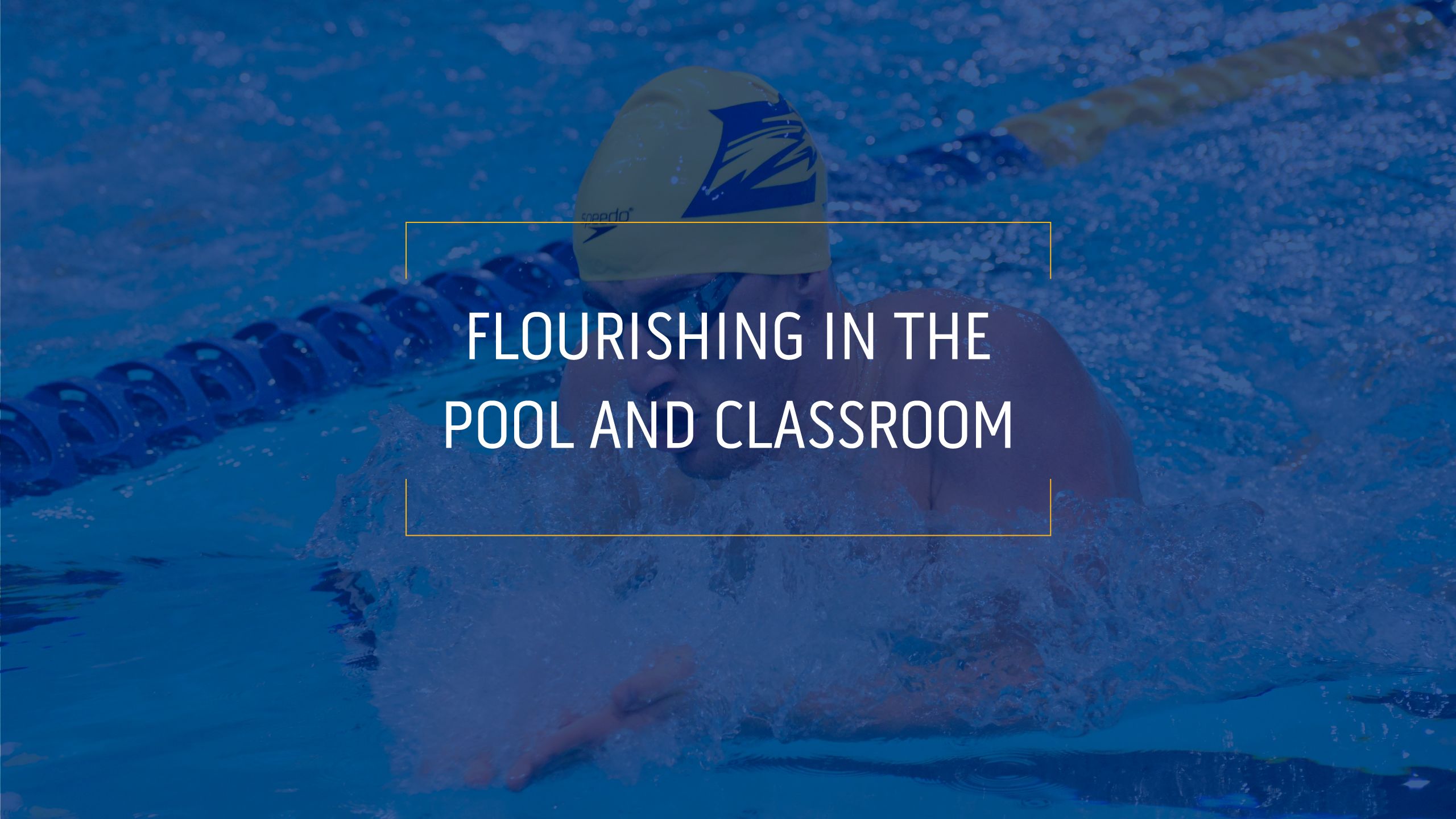
When Wilson chose to attend Emory, he wasn’t just looking to join a top collegiate swimming program. He was looking for a challenge academically, too.
“My mom and I did the standard college tour during my junior year of high school, and we looked at a bunch of places, but I honestly didn’t like very many of them at all,” Wilson says. “When I stepped foot on Emory’s campus, however, it just kind of felt right.”
Originally, Wilson considered engineering schools, but he wasn’t sure he wanted to become an engineer. At Emory, he says, he could pursue a double major in physics and applied math but have a host of options of other great academic programs in case he went a different path.
He excelled in the classroom right from the start, going on to earn a 3.96 GPA in math at Emory, becoming an Academic All-American and graduating with honors from Emory College of Arts and Sciences. He got one B, amusingly enough, in Principles of Physical Fitness-Swimming because he missed a quiz or something, Howell says.
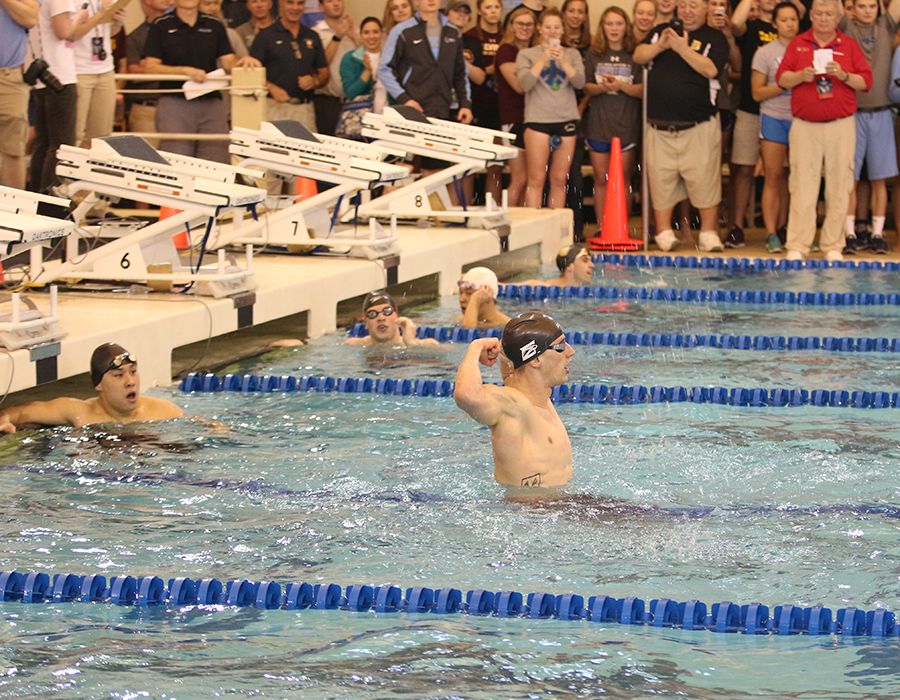
Andrew Wilson set a record in the 100-meter breaststroke final at the 2017 NCAA Division III Swimming Championships.
Andrew Wilson set a record in the 100-meter breaststroke final at the 2017 NCAA Division III Swimming Championships.
“I think I’m someone who benefits from structure and from intellectually stimulating environments, and Emory was both of those for me,” Wilson says. “My physics and applied math professors — especially Ken Ono and Jim Nagy — were very supportive of me in the classroom, in the pool, and in my life in general. Those close relationships and challenging environments just kept driving me to be better and get the most out of myself.”
Nagy bonded with Wilson over their shared experiences of being student-athletes. “I found out he was a swimmer, and I knew firsthand what he was going through. The challenges of balancing strenuous academic work with the strain of training, traveling and competing,” says Nagy, Emory’s Samuel Candler Dobbs Professor and chair of the Department of Mathematics.
But what impressed Nagy about Wilson was that he was just as accomplished a scholar as he was a swimmer. “He was taking PhD-level mathematics courses as an undergraduate honors student,” Nagy says. “That’s kind of incredible. He has a brilliant mind matched with an unquenchable curiosity and drive. I know he’s going to be extremely successful with whatever he decides to do in or out of the pool.”
Wilson says he had no problem balancing academics with athletics. “I waste less time when I have less time,” he says. “If I was struggling in the pool, I could turn to a math or physics assignment to focus on instead of stewing over a bad practice. And then if I was stressed with midterms or something like that, then going into the pool and working out would always be a source of stress relief for me.”
Howell notes that sometimes he’d find Wilson at a team gathering with his head down working on an assignment a professor had just sent him. “Andrew knew how to have fun and relax, but solving problems helped him cope with the pressure,” he says.
In the pool, however, it took Wilson a few long months to adapt to the pressures of collegiate competition. “I was pretty raw as a swimmer — and out of shape — when I got to Emory,” Wilson says.
As he trained to get stronger and adjust to the tougher demands now being placed on him as a swimmer, he failed to make the travel team during the first semester of his freshman year. This early lack of progress frustrated Wilson, but he was determined to get better.
He drew strength from Emory’s close-knit community of coaches and fellow student-athletes who supported him through the rocky transition. “I got to campus and instantly had 70 friends who were all close and I knew I could count on — basically like one big family,” Wilson says.
His hard work and patience with the process paid off when, that winter, everything finally started to click. “We did a training trip in Florida between semesters where he could really focus on swimming,” Howell says. “And that’s when I saw the spark and potential in him come to life.”
The freshman swimmer rallied spectacularly in the spring, making the all-conference team, representing Emory at the D-III nationals, and earning All-American honors, Howell says.
In his sophomore year, Wilson’s goal was nothing less than to win the D-III nationals in the 100- and 200-meter breaststroke, but ultimately he fell just short — finishing second in both events.
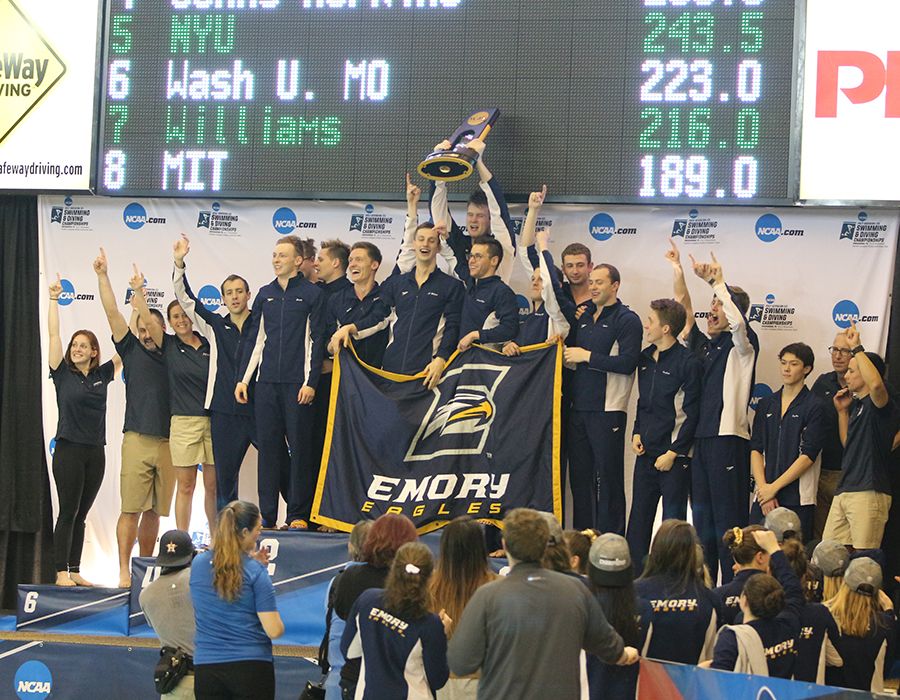
Emory's men's swimming team celebrates winning the 2017 NCAA Division III National Championship.
Emory's men's swimming team celebrates winning the 2017 NCAA Division III National Championship.
“He was devastated, but he learned so much from that experience and made enough adjustments to come back stronger than ever,” says Howell, who adds that Wilson has an uncanny knack for quickly learning from his mistakes.
Wilson won three races at D-III collegiate nationals the very next year, earning CSCAA National Swimmer of the Year honors. That summer, competing against Division I swimmers, he won his first U.S. national title in the 100-meter breaststroke.
That success led him to take a year off from his studies to train at the University of Texas at Austin in preparation for the 2016 Olympic swim trials. Wilson fell shy of making the team and returned to Emory for his senior year, where he helped lead the swimming team to the NCAA national championship and graduated in 2017 with twin degrees in applied math and physics.

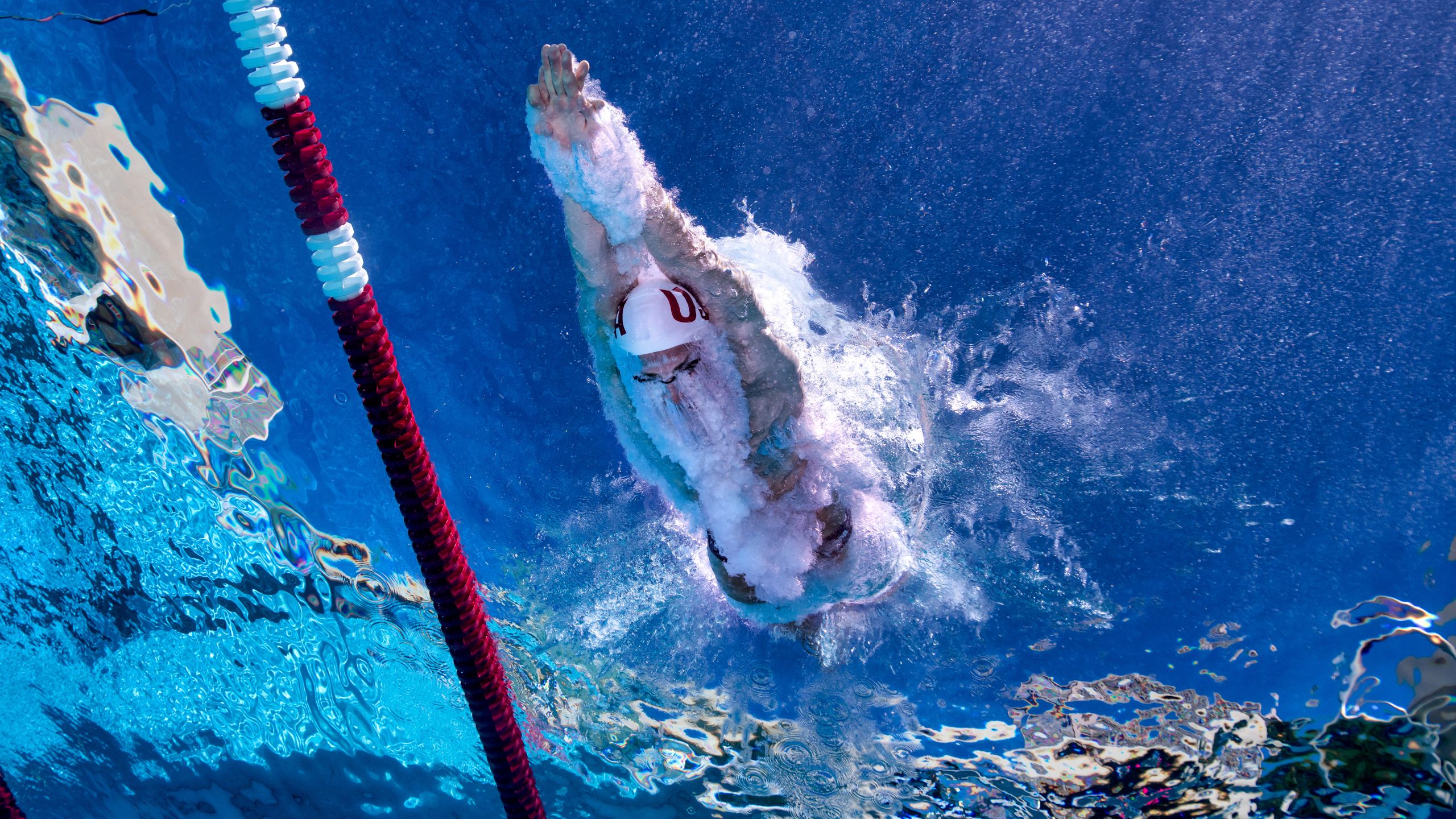
The Tokyo Olympics and Beyond
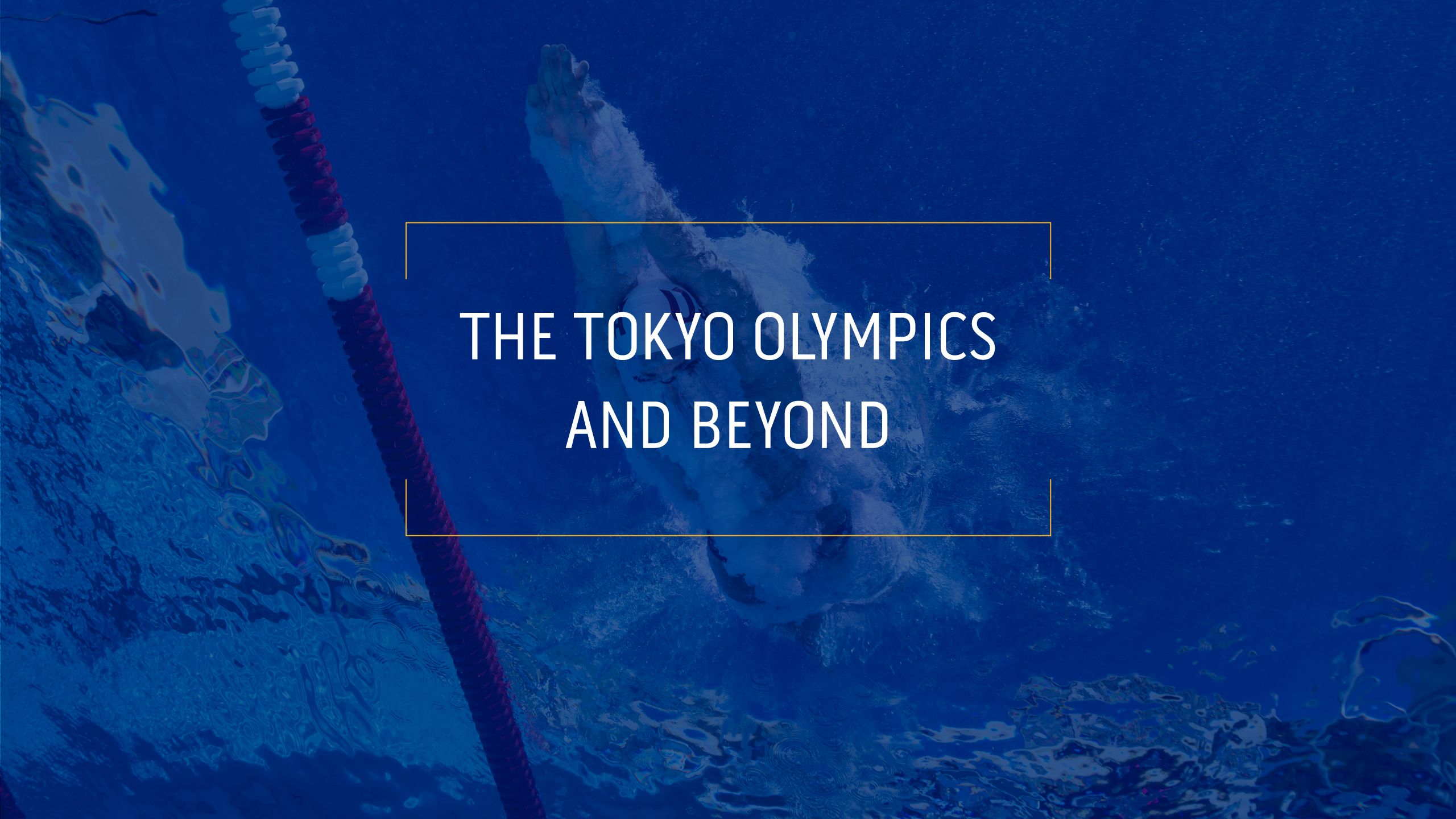
It’s telling that fresh off his early Olympics hopes being dashed, Wilson dove right back into the water, determined to make the 2020 Olympics in Tokyo. Of course, that decision led to an unforeseen extra year of training after COVID-19 pushed back the Tokyo Games.
“I knew I was better than I had shown at the 2016 trials, and that I had plenty of room to improve,” Wilson says. “There was no discussion, no doubt in my mind that I would try again.”
See Andrew Wilson discuss how Emory shaped and supported him through the years.
See Andrew Wilson discuss how Emory shaped and supported him through the years.
At the U.S. trials this past June, Wilson not only fulfilled his decade-long goal of qualifying for the Olympics by finishing second in both the 100- and 200-meter breaststroke, but he also cemented his place in history and showed that D-III swimmers can compete at the sport’s highest level.
“It’s kind of strange how something that you planned and worked for over so many years can still be shocking, but it was,” Wilson says. “It was just pure, pure joy and a redemption for coming up short in 2016. I don’t think that until after the games end in August that what I’ve accomplished — no matter how I do at the Olympics itself — will really all set in and hit me.”
Wilson’s success has also had an impact on his alma mater.
“In the last seven to 10 years, we’ve really tried at Emory to transcend some of the traditional barriers that D-III swimmers and programs have faced,” Howell says. The distinguishing factor in comparing Division III programs to Division I and II institutions is that Division III features athletes who receive no financial aid related to their athletic skills.
“We’ve had swimmers — both men and women — compete at the Olympic trials. We’ve had swimmers compete at U.S. Nationals. Andrew’s not the first to have success at that level, but he’s taken it further than anyone else we’ve had. He’s our poster child for what is possible.”

Andrew Wilson celebrates finishing in second place in the 100-meter breaststroke at the 2021 U.S. Olympic Trials, securing his spot to represent Team USA in Tokyo. Photo by Al Bello for Getty Images.
Andrew Wilson celebrates finishing in second place in the 100-meter breaststroke at the 2021 U.S. Olympic Trials, securing his spot to represent Team USA in Tokyo. Photo by Al Bello for Getty Images.
***INSERT PARAGRAPHS ABOUT ANDREW'S PERFORMANCE AT OLYMPICS AND QUOTES ABOUT THE EXPERIENCE***
No matter what happened at the Tokyo Olympics, Wilson said he was going to retire from competitive swimming when the games are done. And he kept to his words.
The next chapter in his life may be even more fulfilling.
His prowess in the academic arena will take him to Oxford University and London this October, where he will start a graduate program in math modeling and scientific computing.
“I’m really excited to get back into an academic environment — it’s something I’ve missed and craved for the past couple of years,” Wilson says. “I’m also really excited to experience living abroad. I’m just excited to start the rest of my life. There’s more to life than swimming, and I’m finally going to see what that is.”
This new path may eventually lead him back to sports. “My dream would be to work in Formula 1,” Wilson says. “I think it would be a great way to combine my academic side with my competitive athletic side, because when my body is no longer able to compete, I can still use my mind.”
About this story: Story by Roger Slavens. Photos and video by USA Swimming. Additional photos by Emory Photo Video and Getty Images. Design by Laura Dengler and Elizabeth Hautau.

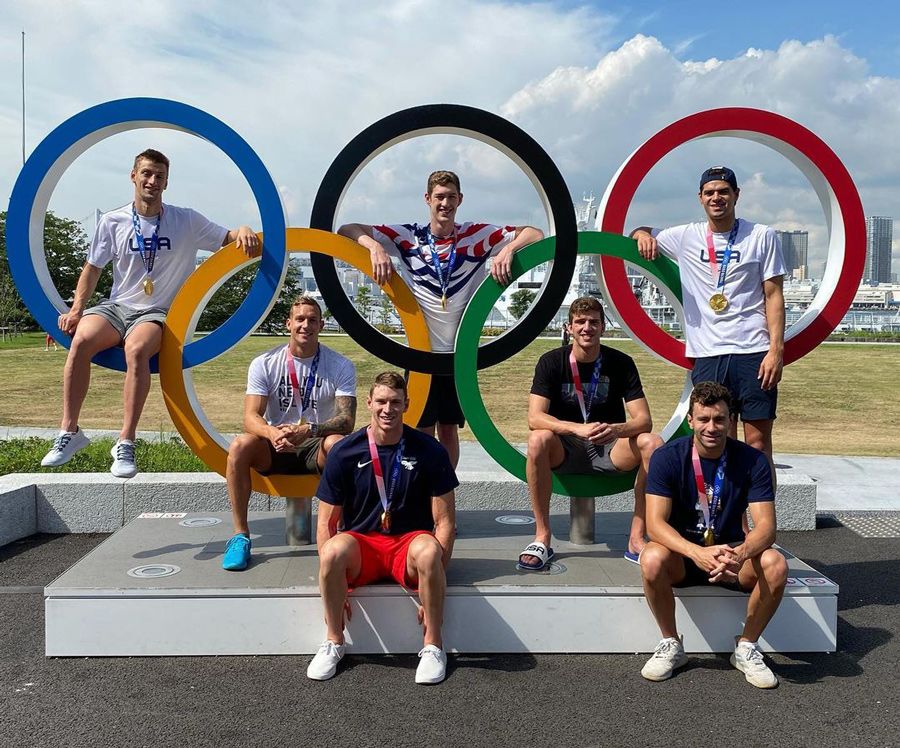
Andrew Wilson (top left) and other members of the men's 4x100 medley relay team pose with their gold medals. Photo courtesy of USA Swimming.
Andrew Wilson (top left) and other members of the men's 4x100 medley relay team pose with their gold medals. Photo courtesy of USA Swimming.
Emory alum Andrew Wilson represented Team USA in the men’s 100- and 200-meter breaststroke at the Tokyo Olympics. He also competed in the qualifying heats for the mixed 4x100-meter medley relay and the men’s 4x100 medley relay.
Andrew Wilson's Olympic Results:
Saturday, July 24: Wilson placed second in his 100-meter breaststroke heat with a time of 59:03 seconds, qualifying for the semifinals. He placed fifth in Semifinal 2 with a time of 59:18. With the eighth fastest time out of the two semifinal races, he qualified for the finals.
Sunday, July 25: Wilson tied for sixth place in the final for the 100-meter breaststroke with a time of 58:99 seconds.
Tuesday, July 27: Wilson swam a time of 2:09.97 in his preliminary heat for the 200-meter breaststroke, just missing qualifying for the semifinals.
Thursday, July 29: Wilson swam breaststroke for the U.S. team in the preliminary heat for the mixed 4x100 medley relay. The U.S. finished with the second-fastest time out of the two preliminary heats, qualifying for the final on Friday.
Friday, July 30: Wilson swam breaststroke for the U.S. team in the qualifying heat for the men's 4x100 medley relay. The U.S. finished with the seventh-fastest time out of the two preliminary heats, qualifying for the final on Saturday night.
On Friday night EDT, Team USA placed fifth in the final for the mixed 4x100 medley relay. Wilson swam breaststroke for the U.S. team in the qualifying heat, but did not swim in the final.
Saturday, July 31: Gold medal! Team USA won the gold medal in the men's 4x100 medley relay. Andrew Wilson swam breaststroke for the U.S. team in the qualifying heat. Swimmers who compete in the preliminary heats for relays earn medals even if they do not swim in the final race because their contributions helped the team reach the medal round.
Want to know more?
Please visit Emory Magazine, Emory News Center, and Emory University
Emory Athletics

